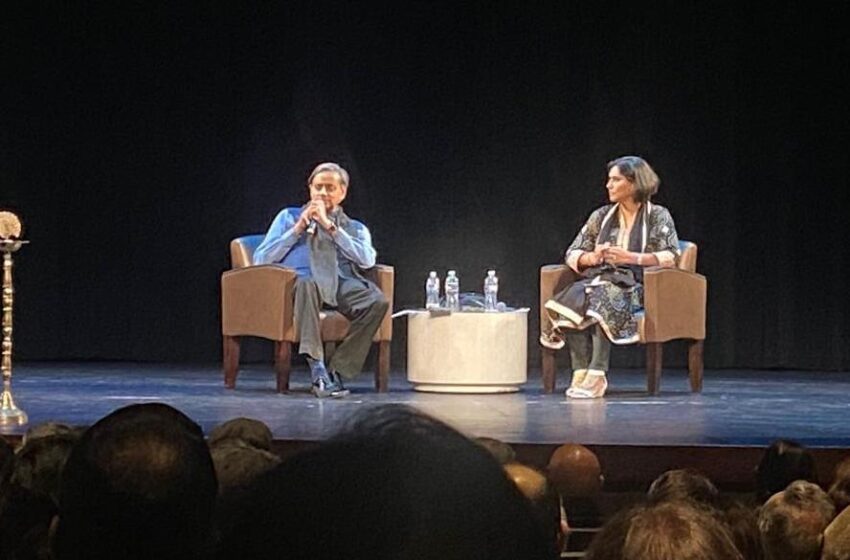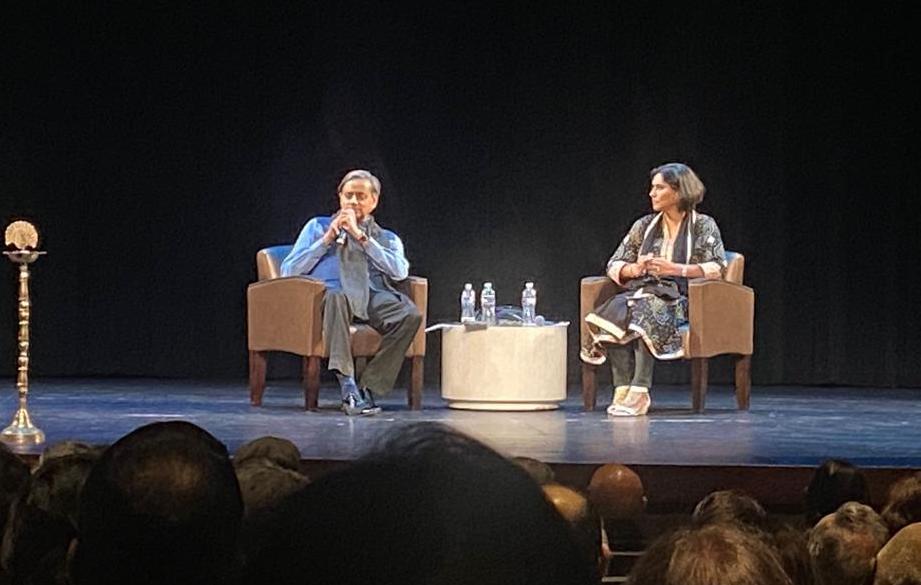Shashi Tharoor inaugurates DC South Asian Literary Festival

Indian author and parliamentarian Shashi Tharoor speaking at the third annual DC South Asian Literary Festival in Rockville, MD, on May 5. The discussion was moderated by prominent immigration attorney Sheela Murthy (right).

Tharoor speaks about a range of topics including his literary works, his Hindu faith, geopolitics, and the state of Indian democracy.
Writer, diplomat, and parliamentarian Shashi Tharoor inaugurated the third annual DC South Asian Literary Festival in suburban Washington, DC, on May 5. The 10-day event, hosted by the DC South Asian Arts Council, features several well-known authors from around the country.
At the inaugural function, held at the Jewish Community Center in Rockville, MD, Maryland Lt. Gov. Aruna Miller, prominent immigration attorney Sheela Murthy, master of the ceremony Niharika Chibber Joe, and the founders of DC South Asian Arts Council, Manoj and Geeta Singh, joined Tharoor on stage to light the traditional ceremonial lamp.
READ: Shashi Tharoor to headline DC South Asian Literary Festival (April 7, 2023)
More than 300 people from the Washington, DC area and nearby regions attended a Q&A session with Tharoor, who has an impressive collection of works, comprising four fictional pieces and more than a dozen nonfiction books, several of which have received high acclaim.
During the 90-minute discussion, moderated by Murthy, the charismatic member of parliament from Thiruvananthapuram, one of the most powerful and eloquent speakers in Indian politics, did not disappoint his audience.
He covered a range of topics including his literary works, his Hindu faith, geopolitics — especially, the Ukraine war and the Chinese incursion inside the Indian border — the state of Indian democracy and the press freedom in the country, and the challenges faced by his party, the Indian National Congress.
READ: Second DC South Asian Literary Festival opens on April 16 (March 23, 2022)
Murthy began the discussion by asking Tharoor about his 2015 Oxford Union debate, in which he argued that Britain owes reparation to its former colonies.
The Congress leader said he was surprised by the widespread response the debate received.
It went viral on digital media, with a video posted on the YouTube channel of Oxford Union alone receiving more than 10 million views.
Tharoor said initially he was not in favor of reparation because he thought that it was difficult to “quantify in any meaningful terms, the enormous amount of damage” and put value to the lives of the 35 million individuals who lost their lives due to famine caused by the actions of the colonial power.
So he proposed a symbolic reparation of “one pound a year for the next 200 years,” which would constantly remind the British of their “injustices rather than a one-time check that no finance ministry can issue.” Tharoor said that the “opportunity to actually lay a case against colonialism in Britain to a British audience” was what he thought was worth doing.”
The popularity of the debate inspired him to write a book titled “An Era of Darkness: The British Empire in India” in 2016, which was published in the United States as “Inglorious Empire: What the British Did to India” a year later.
The Congress MP expressed disappointment that the British have only offered a “regret” so far, rather than a full-throated apology, or reparation.
Tharoor also discussed the origin of another of his bestsellers, the 2017 tome “Why Am I a Hindu?”
Saying that he wrote the book out of a sense of frustration, the writer-politician did not mince words when talking about the rise of Hindutva, especially since the Bharatiya Janata Party, led by Prime Minister Narendra Modi, came to power in 2014, and the ongoing marginalization of minorities.
Tharoor was greeted with loud applauses when he said he cherished the Hinduism preached by Swami Vivekananda and practiced by his parents’ generation that fought for India’s independence, “embracing our universality and acceptance, not the narrow-minded bigotry that was being peddled, in the name of my faith, by people for a political purpose.”
“They seem to be reducing the soaring majesty of the Upanishad and of the Hindu texts, of the wonderful lens of philosophical inquiry of Hinduism into something much more like the team identity of the British football hooligan,” he said.
Tharoor said that he went back to India and joined the Congress party after leaving the United Nations because he wanted to make a difference, and he admitted that life as an opposition politician is tough.
Asked how he wished to be remembered, Tharoor recalled his response to a similar question previously: “I said, look, I have already been a former minister and one day I will be a former MP, but I hope to never be a former writer,” he said.
Tharoor, who wrote short stories during his student days, revealed that fiction was always his passion, and he enjoyed reading it. However, he shifted to nonfiction because he always had a demanding profession. He said, “The problem with fiction is, it’s not just that you need time, which is scarce enough for anybody with another profession, but you also need space inside your head, to create an alternative universe, populated with people characters, episodes, lines of dialogue, that have to be as real to you while you’re living in that world as what you’re encountering… in your regular daily life.”
The second day of the festival, May 6, featured Arundhati Subramaniam, winner of the Sahitya Academy Award, the Raza Award for Poetry, the Zee Women’s Award for Literature, and the International Piero Bigongiari Prize in Italy.
